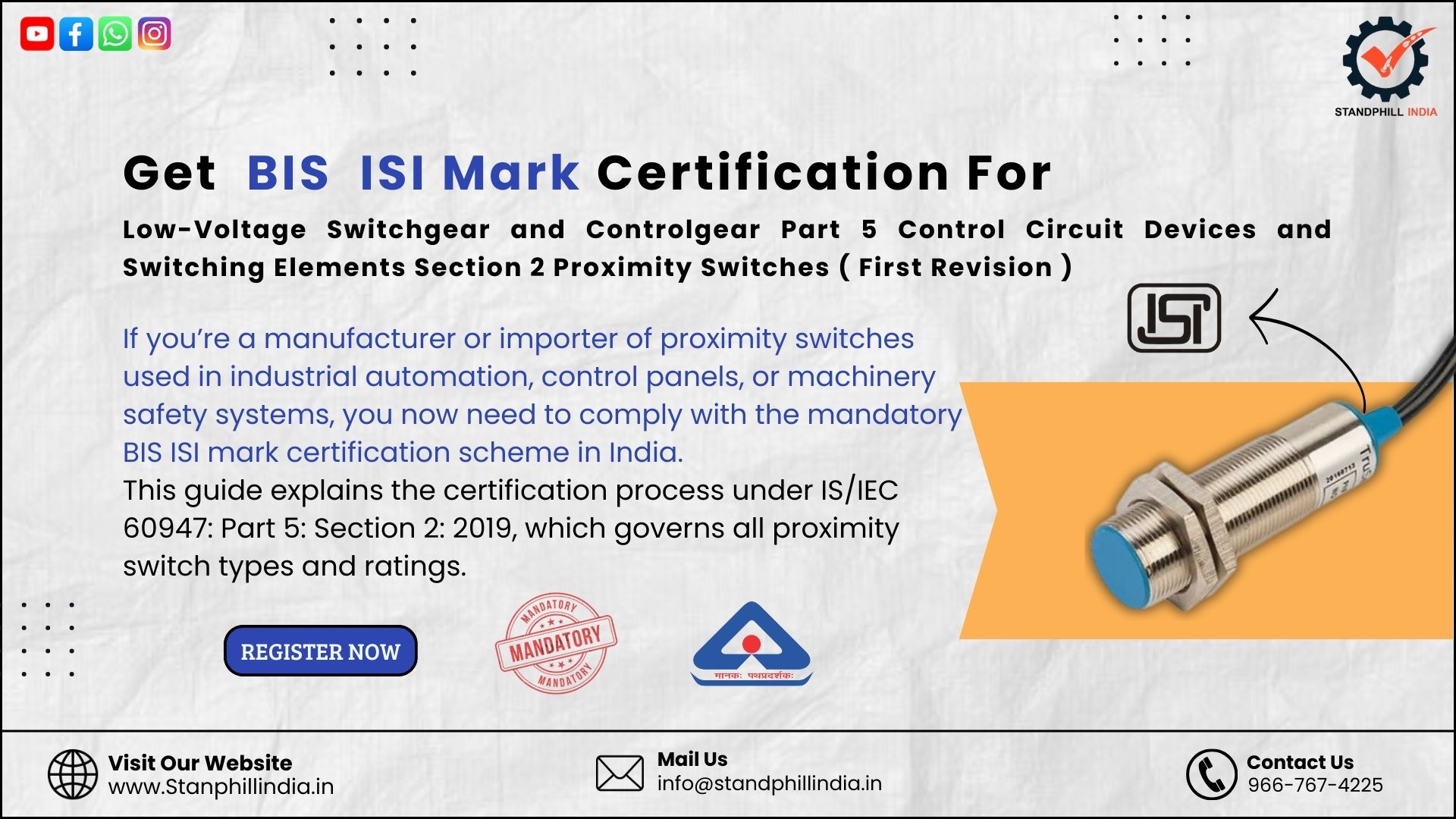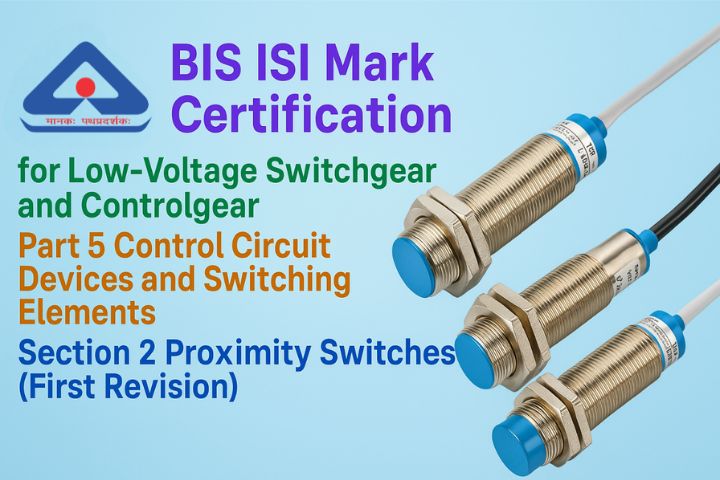Welcome to Standphill Certificate Consultants
- CALL US: +91-85279 30453
- Mail US : info@standphillindia.in
- ADD US : Standphill Delhi
- CALL US: +4207 700 1430
- Mail US : London@Consulting.com
- ADD US : Standphill.Delhi

As industries shift toward smarter and more automated control systems, proximity switches have become essential components for non-contact sensing in automation, machinery, and safety systems. These sensors play a critical role in enhancing operational efficiency and reducing mechanical wear.
To regulate their quality and safety, the Bureau of Indian Standards (BIS) has mandated ISI mark certification for proximity switches under the Indian Standard IS/IEC 60947-5-2. This move ensures only compliant, reliable devices are used in industrial and commercial applications.
What Are Proximity Switches?
Proximity switches are contactless sensing devices that detect the presence or absence of an object within a specific range. They are commonly used for:
Automation systems
Conveyor belt operations
Robotics and assembly lines
Security and safety mechanisms
Types of proximity switches include:
Inductive (for metallic objects)
Capacitive (for non-metallic materials)
Photoelectric
Magnetic and ultrasonic types
Applicable Indian Standard
Standard Code: IS/IEC 60947-5-2
Title: Low-Voltage Switchgear and Controlgear – Part 5: Control Circuit Devices and Switching Elements – Section 2: Proximity Switches (First Revision)
Certification Scheme: ISI Mark Scheme (Scheme I)
Regulatory Body: Bureau of Indian Standards (BIS)
Compliance: Mandatory under the Quality Control Order (QCO) issued by the Ministry of Heavy Industries / Department of Electricals
Why BIS Certification Is Mandatory
Proximity switches operate in sensitive environments where failure can result in equipment damage or safety hazards. The BIS certification ensures:
Consistent product quality and performance
Safe operation in various industrial conditions
Conformity to global IEC standards
Prevention of inferior or unsafe imports
Legal compliance for sale or use in India
From the date specified in the QCO, it is illegal to sell or distribute non-certified proximity switches in the Indian market.
Key Testing Requirements Under IS/IEC 60947-5-2
Sensing Distance and Accuracy
Hysteresis Measurement
Switching Frequency
Voltage and Current Ratings
Short-Circuit and Overload Protection
Environmental Tests (humidity, temperature, vibration)
IP Protection and Mechanical Durability
All tests must be performed in BIS-recognized laboratories.
BIS Certification Process for Proximity Switches
The certification falls under Scheme I – Product Certification (ISI Mark). The process includes:
Application Submission on the Manakonline Portal
Document Upload (company registration, technical files, QC procedures, etc.)
Sample Collection & Testing in BIS-approved labs
Factory Audit by BIS officials
Grant of License and approval for ISI mark usage
Post-certification surveillance and periodic renewal audits

Documents Required
Company/Firm Registration
Product Specifications and Circuit Diagrams
Manufacturing Process Flowchart
List of Manufacturing and Testing Equipment
In-house Testing Reports (if available)
Label and Packaging Samples
Authorized Signatory Identity
Quality Control Manual
Power of Attorney (for foreign applicants)
Certification for Foreign Manufacturers
International brands must apply through the Foreign Manufacturers Certification Scheme (FMCS) and appoint an Authorized Indian Representative (AIR) to act as their liaison with BIS.
Approximate BIS Certification Fees
| Fee Component | Estimated Cost (INR) |
| Application Fee | 1,000 |
| Product Testing | 25,000 – 1,00,000 |
| Factory Audit | 7,000 – 15,000 |
| Annual License Fee | 1,000 |
| Marking Fee (per unit) | Based on production volume |
How Standphill India Can Help
Standphill India provides complete consultancy and implementation support to manufacturers—domestic and international—for BIS certification of proximity switches.
We Offer:
Standard interpretation and scope clarification
Document preparation and BIS portal application
Lab testing coordination and technical support
Factory audit readiness assistance
License grant follow-up and renewal support
With our expert guidance, you can achieve BIS certification smoothly, avoid costly delays, and ensure your product is legally marketable in India.
Conclusion
BIS certification under IS/IEC 60947-5-2 is now a critical regulatory requirement for proximity switches in India. It ensures the safety, reliability, and efficiency of components used in automation and control systems.
If you're a manufacturer or importer of proximity switches, it’s essential to act now and initiate the certification process before the QCO enforcement date. Standphill India is here to help you every step of the way.
For More Blogs Click Here.
- BIS Certification for Printers in India – Complete Process
- Get BIS Certification For Block Boards IS 1659:2004
- BIS Certification for Fire Extinguishers in India
- BIS Certification for Solar Water Heating Systems in India
- BIS Certification for Hand Tools - Process, Documents, Fees
- BIS Certification Guide for Hydrogenated Rice Bran Fatty Acids: Process, Documents & Fees
- BIS Certification for HDPE/PP Woven Sacks for Packaging of 50 kg Cement IS 11652
- BIS Certification for HDPE/PP Laminated Woven Sacks for Mail Sorting, Storage, Transportation and Distribution IS 17399
- BIS Certification for PP Woven Laminated Block Bottom Valve Sacks for 50 kg Cement Packaging IS 16709
- BIS Certification for Semiconductor Motor Controller & Soft Starter - IS/IEC 60947-4-2
- BIS Certification for Semiconductor Controllers & Contactors for Non-Motor Loads - IS/IEC 60947-4-3
Request a call back.
For Business: For Business inquiry fill our short feedback form or you can also send us an email and we’ll get in touch shortly, or Toll Free Number +91 85279 30453.
Office Hours : 09:00 and 20:00 Mon to Sat, Sun - Closed
